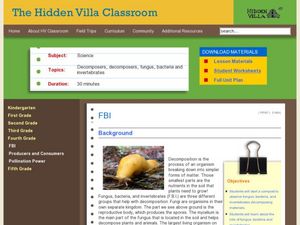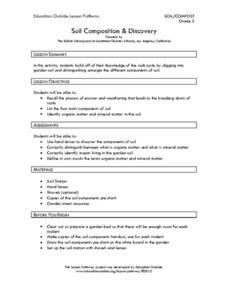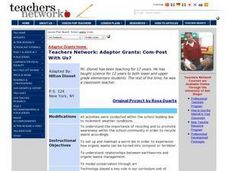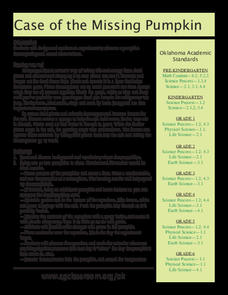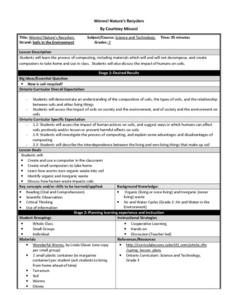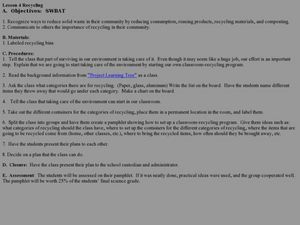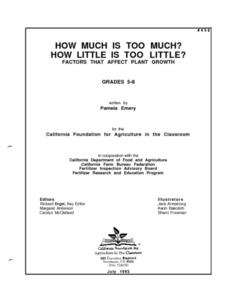Curated OER
The Rotten Truth
Fourth graders investigate compost. In this Science lesson, 4th graders take notes on the components of soil and its relation to plant growth. Students describe the steps in making compost.
Curated OER
Vermiculture Food Waste Compost Program for Touchstone School
Young scholars explore the advantages of composting. In this recycling lesson students complete a worm compost project and collect food waste to feed them.
Curated OER
FBI
Fourth graders experiment with compost. In this Science instructional activity, 4th graders begin a worm compost as well as an outdoor compost. Students discuss decomposition.
Curated OER
Organic and Inorganic Waste
Students conduct a scientific investigation about organic or inorganic waste. In this organic or inorganic waste lesson, students create a compost heap to determine the difference between inorganic and organic waste. Students...
Education Outside
Soil Composition & Discovery
Organic or mineral? How does the matter matter? Second graders use their knowledge of the rock cycle to label the different components in garden soil.
Curated OER
Decomposers at Work!
Students design and conduct investigations that illustrate the process of decomposition. After a lecture/demo, students simulate the process of soil composting in the classroom. They closely chart the decomposition of their soil.
Curated OER
Com-Post With Us?
Students discuss the importance of reducing, recycling and reusing materials to help the environment. As a class, they create a worm bin and observe how it turns material in to compost. They use the internet to research the...
Curated OER
Vermicomposting
Fourth graders explore insect life by viewing a soil presentation in class. In this composting lesson, 4th graders read assigned text about the process of composting soil and the necessity of soil in plant life. Students view video clips...
Curated OER
"Leaf" It in Your Yard
Students research about the process of composting. Students apply their research by creating a compost pile at school that will be maintained once or twice a month for the remainder of the school year.
Curated OER
Case of the Missing Pumpkin
Scientists define and discuss decomposition, and watch pumpkins decompose and return to soil in classroom experiment. They record the date the experiment began, chart changes in pumpkins on a calendar, count how many days it takes...
Cornell University
Fibers, Dyes, and the Environment
Nanofibers can be made through electrospinning or force spinning in order to reduce the negative impact on the environment. Pupils study the role of fibers and dye on the environment through a series of five hands-on activities. Then,...
Curated OER
Investigating the Response of Worms to Soil Improvers
The worms crawl in, the worms crawl out, but do they care what soil is all about? Find out in an easy and fun controlled experiment. Have your young biologists hypothesize, test, and draw conclusions about which type of soil worms...
Curated OER
Worms, Nature's Recyclers!
Young scholars study what worms need to survive in different environments. They study how worm composting improves soil and reduce waste. They discuss composting techniques and present a puppet show about a worm's life.
Curated OER
Solid Waste Recycling
Students plan a "no garbage" lunch and hold a classroom contest to sort grabage into what can and what can't be recycled. They assess the importance of reducing the amount of garbage in the environment and set up a book recycling program.
Curated OER
Making Your Own Sampling Tools
Learners examine cause-and-effect relationship between human attitudes and behavior in the environment. They also assist citizens in increasing their sensitivity and stewardship for the environment.
Curated OER
Causal Patterns in Ecosystems Section 3
Students design and create a worm and worm free compost tanks for observation of decay in ecosystems. They make predictions, care, and revist tanks using their journals for observation and data collection.
Curated OER
Can Worms See?
Second graders discuss the previously created worm compost and the importance of living creatures to the Environment. In this worm lesson, 2nd graders observe worms and record their sensitivity to light. Students design a petri...
Curated OER
Recycling: lesson 4
Students create plans in order to reduce solid waste. For this recycling lesson plan, students discuss and come up with plans to reduce consumption, reusing products, recycling materials, and composting and then present their plans to...
Curated OER
How Much Is Too Much? How Little Is Too Little?
Students perform a series of experiments which show that plants require nutrients in certain quantities. They also cooperatively read materials on the nutrient requirements of plants, fertilizers, composting, and soil management, and...
Curated OER
EcoFluxx
Students describe examples of predator/prey relationships in nature explain how some animals protect themselves from predation better follow all directions presented to them become more flexible, adaptable and literate learners. They...
Curated OER
Vermicomposting
Third graders study vermicomposting. In this vermicomposting lesson, 3rd graders prepare to begin a unit on decomposition by constructing a worm bin. Students collect worms to be used later in experiments.
Curated OER
Rosa Parks Community Garden
Students explore gardening and nutrition in the Rosa Parks Community Garden. They work in stations to discuss food choices, the life cycles of plants, and mini-composting. After starting in one station, they rotate to try each activity.
Curated OER
Vermicomposting
Fifth graders explore agriculture by viewing compost related presentations. In this worm and soil lesson, 5th graders identify the relationship between good soil and the worms who inhabit it by reading assigned text in class. Students...
Curated OER
It's Not Easy Being Green
Students complete a unit that focuses on their school's waste production. They conduct a litter survey, collect the waste produced in their classroom for a week and generate a waste-audit, and identify how their school can minimize...


